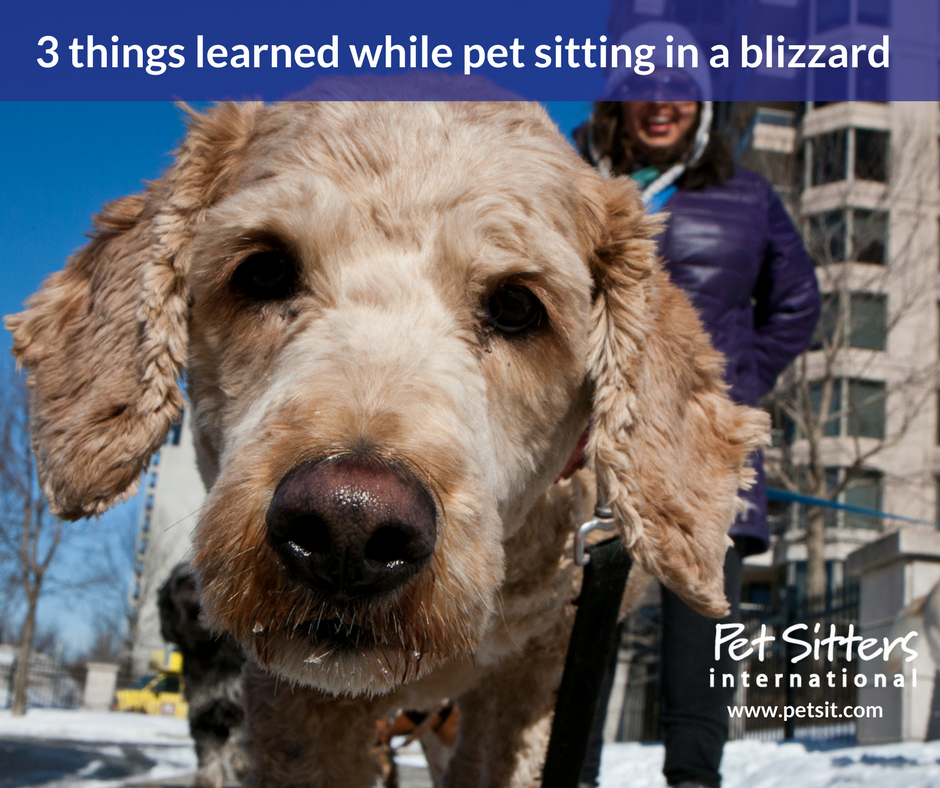3 things learned while pet sitting in a blizzard

As Boston and other cities around the country have seen the snowiest winter on record, professional pet sitters have felt the pain—and dealt with the stresses—of one of the harshest winter seasons in recent history. While some office commuters can work from home and others benefit from delayed business and school openings or the option to take a vacation day, pet sitters don’t often have the option of a “day off,” particularly when pet parents are out of town and their pets still need care. (Pet owners, PSI urges you to take these winter precautions for your pets and consult with your professional pet sitter.)
Many areas of the country have faced unprecedented cold temperatures and wintry participation, and many pet sitters have been forced to deal with the new pet-sitting issues inclement weather caused. Even for pet sitters in northern states accustomed to harsh winters, the severity of this year’s winter season has been challenging and damaging to the morale of even the most experienced pet-sitting business owners and their staff sitters.
PSI reached out to members in Professional Pet Sitters Chat, the association’s private Facebook group to ask pet sitters about the lessons they’d learned this winter.
Overwhelmingly, their responses focused around three main recommendations:
1. Preparation: It’s important to plan ahead and talk to clients in advance about preparations that need to take place for winter weather. For example, what is your company’s policy on snow removal—does the client call before leaving town to arrange this service or do they provide you with their preferred snow-removal company for you to contact if needed? Whatever your preferred policy may be, it’s important to have a plan in place to ensure you are not spending exorbitant amounts of time in frigid conditions to “dig” your way to clients’ front doors for your pet-sitting visits—and it’s important that pet owners understand their cooperation is vital in ensuring you can properly reach and care for their pets.
It’s also important to consider what you would do if icy roads (or a state of emergency/travel ban) make roads impassable and prevent you from reaching clients’ homes. Verify that you have the correct contact information for your clients’ emergency contacts and discuss who you should call if you are unable to reach their homes. (For example, a relative may be the emergency contact, but perhaps, a neighbor could check on the pets if you were unable to reach the home for a day—so make sure you have that information as well!)
2. Personal safety: Harsh weather can take a toll on your physical well-being. The Centers for Disease Control and Prevention (CDC) advises that those working outdoors in the winter wear appropriate clothing, sprinkle sand or cat litter on icy patches, be aware of the wind chill factor and work slowly when doing outside chores.
PSI member pet sitter Jamie Hoad shared this advice in PSI’s private Facebook group: “Long johns, scarves and chap stick are your best friends. The cold hasn’t really been a problem—the wind is the issue. It’s quick, fast and the chill brings the temperature down about 20 degrees. Wind burn is no joke, so wrapping up extra good is key!”
The harsh winter weather also makes what would typically be a minor inconvenience—a flat tire or car trouble—a dangerous predicament. The CDC advises checking your tire tread or replacing tires with all-weather tires if necessary, along with keeping an emergency kit in your vehicle. PSI member Jordan Di Marco shared similar advice in the PSI Facebook group: “I keep a good deal of winter stuff in my car—kitty litter, foldable shovel, extra hats and gloves, Yak Trax, flashlights, jumper cables and hand warmers.” (Note: Hand warmers – and foot warmers – are inexpensive, with many options to choose from. Most have long shelf lives as well.)
Icy roads and slippery sidewalks make it more important than ever for pet sitters to exercise caution to avoid slips and falls. One pet sitter reported a fractured wrist and dislocated rib resulting from a fall after slipping on ice. Remember, too, that these injuries are not covered under pet-sitter liability insurance. (Workers compensation covers work-related injuries. Contact Business Insurers of the Carolinas to get a quote for your state.)
3. Pets’ safety: In our online discussion about the recent blizzards, PSI member Robyn White shared that “one of the biggest challenges in this snow and cold is how badly it affects the dogs. Their paws get so cold from the snow and ice and they get irritated from all the salt people put down on the sidewalks. It's rough on us and it's also rough on them.” Her concern has been a common one this year—what effect does this cold weather have on pets and how should pet sitters adjust their services to ensure pets’ safety? More specifically, this harsh winter season left many professional pet sitters asking: When is it too cold to walk dogs? Some pet sitters have also been faced with clients who wanted their dogs outdoors for extended periods of time.
To get an answer to this question, PSI reached out to Dr. Tony Johnson, clinical assistant professor at the Purdue University School of Veterinary Medicine and a consultant to the Veterinary Information Network. He offered this advice: “The rule of thumb is ‘if you're cold, your dog is probably freezing.’ A walk to eliminate and stretch your legs is OK. A 45-minute forced march...not so much.”
Dr. Johnson also added, “Cold and pets don’t mix well in many cases. A dog’s degree of cold tolerance can vary – just like with a person. Some dogs that are accustomed to cold and have a dense fur coat will do fine, even into the single digits, if they can stay dry and out of the breeze. A little Chihuahua with no fur and no tolerance to the cold won’t. Dogs that are acclimated to cold conditions will do better than those that haven’t been gradually exposed. There is no single number I can answer when people ask, ‘How cold is too cold?’ but keeping the above guidelines in mind can help keep your pooch safe and comfortable when the snow flies.”
It is important for pet sitters to share these guidelines with clients and suggest alternatives—such as indoor play time—when frigid winter temperatures make it unsafe for pets to be outside beyond short potty-break times.
Surviving the winter…
In addition to focusing on preparation, personal safety and pets’ safety this time of year, there’s another important quality to help pet sitters survive this harsh winter—patience. On the worst days, when it’s too cold to walk even the most energetic dogs, when you’ve had to shovel your way to a client’s door or have had to change a flat tire as sleeting rain pelted down, remember…Spring is coming! Your commitment to providing pet care in even the harshest conditions sets you apart and your clients are surely grateful for the peace of mind you provide, particularly during seasons like this.
Are there any more winter lessons learned you’d like to share? We’d love to hear from you! Comment below, post in Professional Pet Sitters Chat or contact us directly.
Photo source: Devina Singh







Comments
Sondi Moore
We usually expect the majority of our cat owner clients to cancel their visits, sometimes the day of a storm. We do not charge for any cancellations and our sitters know to keep up on messages until right before they leave home. Clients may also contact their sitter directly however our office phone is womanized 24/7 for emergency calls. For those already away and unable to get home: everyone is in contact and we pre-advise in our policy forms our snow and ice policy. Our sitter will be there until roads are closed and back as soon as we know roads are open. We ask our clients to provide our office name and number to their neighbors (we provide additional business cards during our initial meeting just for that purpose) in the event their power is off in the neighborhood or roads are closed due to downed trees or no plowing. We leave out additional dry (and wet in some cases) of food and my office can provide sitters 2 sided, timed feeders to use where extra food cannot be left out. The client has the option on purchasing it when they return or returning it for use again when needed by our sitters. If a cat requires insulin, our sitter is required to stay at the client's house overnight until roads are open. The client is not required to pay our overnight fee (although they have that option) but the company does pay the sitter extra pay for their time. We also have some sitters with 4 wheel drive who offer to help others around.
We also know that bad weather means lots of dirty, wet feet and we ask our sitters to remember to remove their shoes when entering someone house. If keeping areas clean is just not possible with many visits, our office can arrange free or discounted carpet cleaning from one of our contractors. $125 spent to clean someone's carpet after they return home is just a tiny amount for the company to spend to keep a client who will spend ten times that over the next year.
We know not everything may be perfect when you have 2-3 feet of snow (as we currently have in VA) but we will do whatever we can to get to all our kitty clients and spend extra time with them once we get there.
Diane Purcell